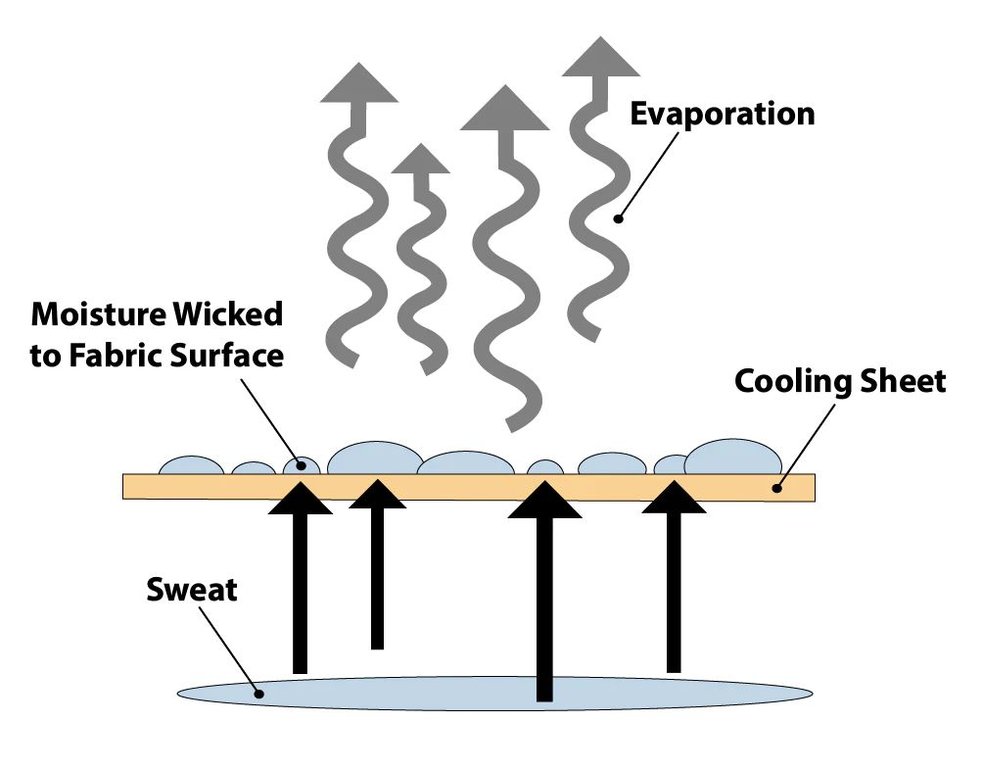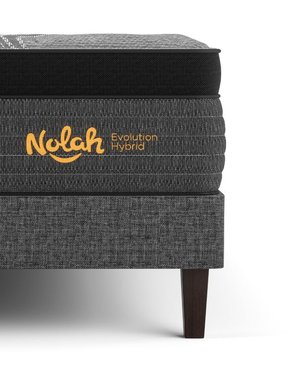The Best Cooling Sheets for Hot Sleepers
What Type of Bed Sheets Keep You Cool and Dry for More Comfortable Sleep?
Everyone knows what it feels like to wake up drenched in sweat with your bed sheets sticking to your skin. Instead of leaving your bed feeling refreshed and ready to take on the day, you crawl out from under the covers feeling like you just ran a marathon. If you wake up warm and damp more often than not, it’s time to make a change to your sleep setup.
Maybe frequent bad dreams send your heart pounding, you have a medical condition that causes night sweats, or you simply live in a humid climate; a long list of factors can make you a hot sleeper. Whatever it is that makes you overheat, you need a cooling solution that lets you sleep comfortably through the night.
Sure, you could crank the AC, but that’ll run up your electric bill and you’ll likely wake up freezing. While an open window or fan may bring some relief, it won't make a big difference if your bed sheets still trap heat. For a more comfortable sleep, you need sheets and blankets that naturally regulate your body temperature and prevent outside air from making you too hot or too cold.
What Features Make the Best Cooling Bed Sheets?
Before we jump into the finer details and compare materials, let's define what we mean by "cooling sheets."
Cooling bed sheets have a specific combination of qualities that work in tandem to regulate your body temperature, keeping it comfortable and consistent throughout the entire night. When shopping for sheets that keep you cool, you should consider all of the following factors:
1) Texture and Feel
Cooling sheets can’t irritate or cling to your skin. While you may love the coziness of flannel and fleece in the wintertime, you don’t want bed sheets that feel fuzzy if you hope to stay cool.
Most materials that make the list of best temperature-regulating sheets have a smooth, satiny feel and minimize friction. The texture of silky bed sheets may not cool you down directly, but it won’t counteract the fabric’s other cooling properties or make you feel confined under the covers.
2) Weight and Breathability
It may sound counterintuitive, but the body's natural drop in temperature during sleep can cause overheating. If you sleep under non-breathable bedding, the excess heat leaving your body has nowhere to go and remains trapped beneath the covers.
To let the hot air out, you need sheets with a relatively open weave that allows ventilation. Lightweight, breathable fabrics with enough room between threads lets heat escape. This prevents the space between you and your bedding from becoming a bubble of humidity.
3) Moisture Wicking
The best cooling sheets are moisture-wicking rather than moisture-absorbing. What's the difference?
Moisture-absorbing fabrics soak up liquids like spills and sweat, effectively keeping your skin dry. While moisture-absorbing materials draw sweat away from the body, they don't dispel it quickly. The liquid remains within the weave, adding weight and uncomfortable wetness to your sheets.
On the other hand, moisture-wicking sheets enable fast evaporation. The fibers pull sweat away from your skin and force it to the surface of the fabric, where it quickly evaporates and has a cooling effect. Moisture-wicking materials mimic the human body's built-in temperature-regulating system that uses sweat and natural evaporation to its advantage.

Added Benefits
Bedding made with a soft, breathable, moisture-wicking material will keep you comfortably cool, but you'll also want to consider convenience and durability.
When shopping for new sheets, blankets, comforters, and duvet covers, be sure to check the labels for care instructions. Proper care is important to ensure your bedding remains clean and lasts for the long haul.
While owning a comforter that requires dry cleaning may not be too much of a hassle, you definitely want sheets you can machine wash at home. Air drying bedding is easy enough, but you should opt for dryer-safe bed sheets and blankets if you mind the wait or don't have to hang all your bedding.
You should also consider longevity before buying new bedding, especially if you decide to splurge on high-end materials. Look for durable fabrics with quality construction, and if you want highly saturated colored sheets, research how well the material holds dye.
How Often Should You Change Sheets? This guide explains everything you need to know about bedsheet maintenance.)
Which Material Makes the Best Cooling Sheets?
Now that you know what to look for in cooling sheets, understanding the characteristics of the most common bedding materials can help you decide which best suits your needs.
Need further guidance to build the perfect bed? Our Best Bed Sheet Material guide and Bedding Types guide have more information.
Bamboo Viscose
Viscose from bamboo bedding has all the recommended cooling qualities described above: a silky-smooth touch, breathability, and moisture-wicking capabilities.
While viscose from bamboo sheets have a glossy look and luxurious feel, they typically cost less than other premium materials like Egyptian cotton and silk. The material is also highly durable, making these sheets an excellent value option for cooling bedding. You can machine wash and dry most bamboo viscose bedding, but always check the label for care instructions.
Tencel™
Botanic-original Tencel™ bed sheets have a lot in common with their bamboo viscose counterparts. They have a silky texture, breathable construction, and moisture-wicking abilities—all the hallmarks of high-quality cooling sheets. Tencel™ sheets are also eco-friendly, durable, and wrinkle-resistant.
Linen
Soft, lightweight, breathable, and moisture-wicking, linen bed sheets check all the boxes for cooling bed sheets. These flax-derived sheets are also eco-friendly, biodegradable, and durable.
Linen bed sheets will certainly keep you cool and comfortable—if you decide to splurge. With linen, the luxurious feel comes at a premium price. Check out this article from Apartment Therapy to learn why linen sheets are so expensive.
Silk
Sleek, smooth, and irresistibly soft, silk sheets are a top-of-the-line luxury with many comfort and cooling benefits. Silk bed sheets wick moisture and regulate temperature, keeping you cool on hot nights but warm in the winter. They're also soothing, durable, breathable, hypoallergenic, and natural.
Unfortunately, silk sheets have two notable drawbacks: the premium price and required care. You cannot machine wash or dry most silk sheets and will have to hand wash your bedding whenever they need refreshing.
Egyptian Cotton
When it comes to quality, cotton bed sheets fall on a broad spectrum. For the sake of comparison, we’ll focus on a popular high-end option: Egyptian cotton sheets with a high thread count.
Premium Egyptian cotton sheets have an incredibly soft feel, resist pilling, and last a lot longer than your average cotton bed sheets. In terms of comfort, Egyptian cotton has few rivals. When it comes to cooling qualities, Egyptian cotton bed sheets have the desired breathability, allowing for excellent airflow.
Not Recommended for Hot Sleepers
Jersey
Jersey sheets made with cotton or a cotton-synthetic blend have the reputation of "budget bed sheets." The knit fabric is affordable, soft, wrinkle-resistant, and low maintenance, making jersey bedding a staple for college students.
However, we don't recommend jersey sheets for those who sleep hot or sweat a lot. They trap heat and can feel a bit too thick and cozy for the summer months.
Microfiber (Polyester)
Microfiber bed sheets get their name from the fine, soft threads of polyester used to weave the fabric. Also considered a budget option, microfiber sheets don't pill and require little maintenance. But for hot sleepers, the benefits end there.
Microfiber sheets are tightly woven, meaning they allow minimal airflow. They tend to trap heat, create static, and can cause skin irritation due to their synthetic nature. Many sleepers also describe microfiber sheets as too thin or even flimsy.
Keeping Cool Under the Covers
What type of cooling sheets will work the best for you? The answer depends on your budget, personal preferences, and how hot and humid it gets in your region. But remember, the best cooling bed sheets offer a smooth feel, superior breathability, and moisture-wicking fibers.
Disclaimer: Nolah does not provide medical advice. All resources on the Nolah blog, including this article, are informational only and do not replace professional medical counsel. Talk to your doctor about any health, mental health, or sleep-related issues.
You May Also Like These Articles
Don't Sleep on Exclusive Offers
Sign up for our newsletter, and you'll be the first to know about discounts, deals, and what's new at Nolah.
Ready for Bed?
